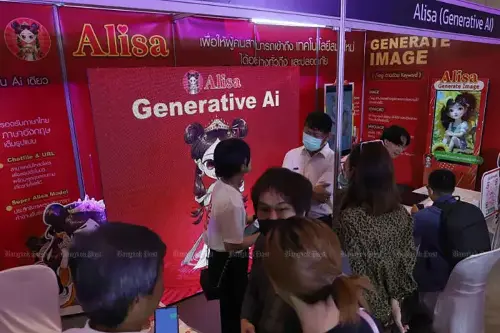
Thailand must embrace artificial intelligence (AI) to drive economic growth, improve the quality of education and strengthen its core industrial sectors, according to an academic and tech pioneers.
The country urgently needs to improve workers' skills and invest in human capital over the next five years, ahead of the arrival of the artificial general intelligence (AGI) economy.
AGI refers to the hypothetical intelligence of a machine that has the ability to understand or learn any intellectual task a human can.
"AI is an important tool for competition in the future," Somkiat Tangkitvanich, president of the Thailand Development Research Institute, said at the NAC 2025 NSTDA annual conference titled "Decoding Thailand's AI Future: Strategy for Competitive Edge", held by the National Science and Technology Development Agency on Wednesday.
He said AI is making breakthroughs in many fields, as it can be used to predict protein structure, analyse child language and discover exoplanets.
Mr Somkiat said there are four types of humans in the age of AI, with the first "smart cyborgs", or people who are good at using AI, with the second type smart users who do not have much capabilities, but embrace AI.
The third type is smart humans who have capabilities but do not know how to use AI and the last is people who do not have capabilities and do not know how to use AI.
He said Thailand has a national AI strategy which focuses on the supply side in terms of AI ethics, infrastructure, people development, innovation and promotion of the use of AI in the public and private sectors.
Mr Somkiat said the strategy should also focus on the demand side, using AI for strategies to tackle the country's challenges, which include slowing economic growth, an ageing society with many people living in poverty, and poor quality education, particularly in reading, mathematics and English.
Thai children score lower than their peers in OECD countries on these subjects, he said.
AI should also strength Thailand's core industries, mainly the healthcare and tourism sectors.
Mr Somkiat said Thailand also needs to increase the quantity and quality of its workforce. He said AI can also be used to enhance the manufacturing system. He cited a joint survey by the Japanese Chamber of Commerce and the Japan External Trade Organization on Japanese factories in Thailand that use AI.
During the second half of 2023, the food and textile sectors used AI for visual inspection, while those in the chemical, metal and machinery sectors used AI for anomaly detection.
AI can also assist education by improving learning capability and preparing couseware for teachers.
AI helps children who are not good at learning to learn faster, an investment that yields 70 times higher return on investment.
He also cited a TDRI survey funded by Fundamental Fund during the second to fourth quarters of 2024 which found demand for hardcore AI skills at 200,000 positions per quarter.
Pochara Arayakarnkul, group chief executive of Bluebik Group, said businesses are keen on trans- forming with AI but noted that it is just a tool.
"AI is just a brain but to realise its full potential requires a complete system. Organisations require applications, infrastructure, cloud, high-quality data, AI governance and cybersecurity," he said.
Meanwhile, AI still has limitations and will need to be further enhanced. Human oversight is still crucial for most AI-enabled processes, said Mr Pochara.
He emphasised the importance of reskilling and upskilling people within organisations to ensure AI-skilled individuals are involved to achieve better outcomes.
Napat Jatusripitak, managing director of the Thailand Future Foundation, said AI has lead to a workforce revolution.
"With the US government's investment in AI, we can expect the AGI to arrive five years sooner than expected. AGI can be labour and capital which does everything like humans. This creates intellectual capital that will become a new factor of production, along with capital, labour and machines," he said.
Mr Napat said AGI can pressure human labour costs, leading to mass job transitions or mass unemployment.
He said businesses need to encourage labour by increasing productivity, making businesses profitable which will lead to more hiring when businesses expand.
He suggested policymakers invest in people to increase the quality and quantity of human capital in the Thai economy.
